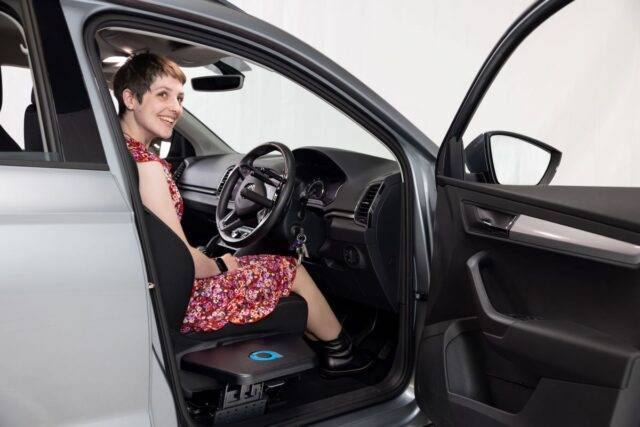What To Expect During a Disability Driving Assessment
Living with a disability can present unique challenges, but with the right adaptations, individuals can regain their independence and enjoy the freedom of driving. One essential step in the process of driving with a disability and obtaining adaptations is a disability driving assessment.
In this blog post, Sean Lawrence, Chief Executive Officer at Herts Ability (a part of Driving Mobility) has provided a comprehensive guide on what to expect during your driving assessment.
How To Find Your Local Disability Driving Assessment Centre
As a registered charity, Driving Mobility accredits a network of 20 driving assessment centres covering the whole of the UK. Many with outreach facilities, these centres include independent charities and NHS centres offering professional information and assessment services to assist people with any medical condition to gain or retain independence. Book your disabled driving assessment with your local disability driving assessment centre.
Assessment Consultation
The assessment process usually begins with an initial consultation with an experienced occupational therapist and approved driving instructor. It’s important to state that the professional and caring teams are there for you and aim to make the assessment process as comfortable as possible for you. You will be welcomed by the friendly team who will discuss your needs and likely ask you about your medical history, including any physical limitations, mobility issues, or visual impairments. They may also inquire about your lifestyle, driving habits, and any specific difficulties you are experiencing with driving.
Physical Evaluation
Next, the assessment may involve a physical evaluation to address any of your concerns about your physical capabilities and assess your strength, range of motion, coordination, and balance. The assessor may also assess your ability to transfer in and out of a vehicle, as well as your posture while driving. This evaluation helps the assessor establish the appropriate adaptations that may be required to suit your unique needs and allow you to return to driving. Adaptations could include hand controls, pedal modifications, steering aids, or secondary control devices. The assessment centre will have a fleet of dual-controlled vehicles designed to facilitate a range of driving situations such as driving using only your left leg or using only one arm/hand.
Eyesight Test
As a driver, you must be able to see the road ahead clearly and have the ability to identify warning signs and directional signposts from a good distance. You will therefore be asked to read a number plate from the minimum legal distance of 20 metres. You can do this using corrective lenses if you use them.
Cognitive Assessment
Some medical conditions can affect the way we think while we are driving. This could be the ability to divide attention, process visual information at a reliable speed, or plan and solve complex junctions and road situations.
If required, you may be asked to undertake some tests before the drive designed to identify whether these abilities have been affected and if so, how the team might be able to help you compensate for such difficulties.
Driving Evaluation
You will be driven to a suitably quiet area by your instructor who will demonstrate the control systems whilst they drive. To establish which control system is best suited to you and your needs, you will be given the opportunity to use the adaptations under the supervision and guidance of the assessment team. This is your opportunity to trial the controls, ensuring you can operate them safely. If necessary, we can explore alternative controls if you experience any pain or discomfort.
Following the introduction to the new controls, you might require further practice/tuition in order to become fully proficient with the adaptation(s). The assessor can provide details of local instructors who can help you with this.
Once you have achieved the required level of competence using the car adaptations, you will be invited to return for a follow-up assessment, where you will be given the opportunity to drive on a variety of roads and in busier traffic to ensure you have adjusted to the new adaptations, follow traffic laws and safety guidelines.
The assessors and instructors are there for you every step of the way. If you are feeling anxious or need a break, they will, of course, allow this and give you some constructive feedback whilst you rest and discuss your progress.
Feedback and Recommendations
Based on the assessment findings, the assessor will provide recommendations on the appropriate car adaptations that would best suit your needs. You will also be given feedback on your performance and advice on next steps. This information will be concluded in a written report which is suitable to send to the DVLA, notifying them of your chosen adaptations.
Some people are unaware that if you need adaptions to control a vehicle, you must inform the DVLA, as codes must be added to your driving licence. The report will outline these codes, ensuring you are legally licenced and insured to drive with the adaptations.
Contact a Driving Adaptation Specialist
Following your driving assessment for disabled, you can contact a vehicle adaptation specialist to select and purchase the exact driving adaptations you require and get them installed in your car. That’s where Mobility in Motion come in.
Our team will provide in-depth advice on the exact style of adaptations for your needs, check and confirm vehicle compatibility, discuss costs and funding options as well as conduct a demonstration so you feel comfortable operating the adaptations. And because we have the widest product offering under one roof, you can be sure that you’re getting the perfect match. With a network of nationwide installers, we can then arrange to install your adaptations into your vehicle and away you go!

News
We Become the Exclusive UK Distributor for Pimas Driver-Control Solutions
We’re excited to announce that Mobility in Motion has become the exclusive UK distributor for Pimas driver-control solutions, including the brand-new Voice Control system. This is…

Accessible travel
Motability Lease Extension Rule Changes
Thank you to Mobility in Motion for inviting MotaClarity back onto the blog, it’s always a pleasure to share updates with your community. Starting 16th…

Accessible travel
Adapting Your Own Car for Accessibility
At Mobility in Motion, one of the biggest misconceptions we encounter is the belief that only Motability Scheme cars can be adapted, or that you need…